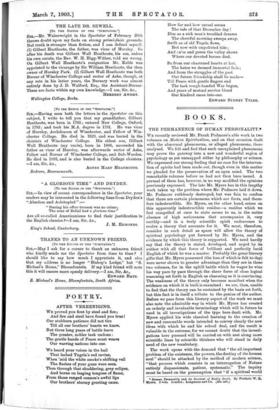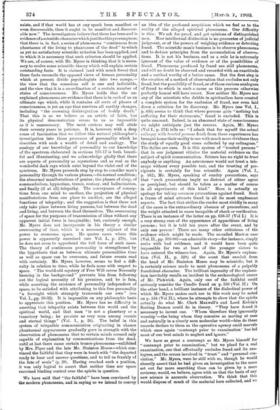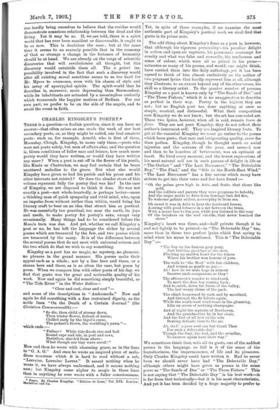BOOKS.
THE PERMANENCE OF HUMAN PERSONALITY.*
WE recently reviewed Mr. Frank Podmore's able work in two volumes on Modern Spiritualism, and on that occasion dealt with the abnormal phenomena, or alleged phenomena, there analysed. We felt and feel that such unexplained phenomena may prove the gateway into a new and wonderful region of psychology as yet unmapped either by philosophy or science. We expressed our strong feeling that no case for the interven- tion of spirits had been made out, though even in this matter we pleaded for the preservation of an open mind. The two remarkable volumes before us had not then been issued. A perusal of them has, however, in no way modified the opinions previously expressed. The late Mr. Myers has in this lengthy work taken up the problem where Mr. Podmore laid it down. Mr. Podmore ruthlessly destroyed, but was fain to confess that there are certain phenomena which are facts, and there- fore indestructible. Mr. Myers, on the other hand, seizes on this apparently indestructible residue—a residue which we feel compelled at once to state seems to us, in the entire absence of high seriousness that accompanies it, very earthly—and in a truly scientific spirit endeavours to evolve a theory that accounts for it. We must, therefore, consider in such detail as space will allow the theory of spiritual psychology put forward by Mr. Myers, and the evidence by which this theory is supported. We need hardly say that the theory is stated, developed, and urged by its author with all that force of brilliant and perfectly lucid English of which he was a master. Probably the great literary gifts that Mr. Myers possessed (the loss of which is felt to-day) were never shown to greater advantage than they are in these two volumes, for in the uphill battle which he wages he wins his way pace by pace through the sheer force of close logical reasoning set forth in English as charming as it is convincing. The weakness of the theory only becomes manifest when the evidence on which it is built is examined : we are, then, unable to feel that the theory can be sustained by the basis set forth, but this fact is in itself a tribute to the genius of the author. Before we pass from this literary aspect of the work we must also note the admirable way in which Mr. Myers has created an orderly and invaluable terminology which will in future be used in all investigations of the type here dealt with. Mr. Myers applied his wide classical learning to the creation of new and reasonable words intended to convey clearly the new ideas with which he and his school deal, and the result is valuable in the extreme, for we cannot doubt that the investi- gations here pursued will be carried on with zest along more scientific lines by scientific thinkers who will stand in daily need of the new vocabulary.
The work opens with the demand that "the all-important problem of the existence, the powers, the destiny of the human soul" should be attacked by the method of modern science, "that process which consists in an interrogation of Nature entirely dispassionate, patient, systematic." The inquiry must be based on the presumption that "if a spiritual world
• Human Personality and its Survival of Bodily Death. By Frederic W. H. Myers. 2 vole. London : Lougmans and Co. [42s. net.] exists, and if that world has at any epoch been manifest or even discoverable, then it ought to be manifest and discover- able now." The investigators believe that there has been and is evidence of a scientific character which j ustifies this presumption; that there is, in fact, a series of phenomena "continuous from phantasms of the living to phantasms of the dead" to which, as yet no satisfactory scientific criterion has been applied, and to which it is necessary that such criterion should be applied. We are, of course, with Mr. Myers in thinking that it is neces- sary to evolve some scientific theory which will explain certain outstanding facts. It is claimed (and with much force) that these facts reconcile the opposed views of human personality which at present divide psychologists into two camps,— the view that the conscious self is one and indivisible, and the view that it is a co-ordination of a certain number of states of consciousness. Mr. Myers holds that the un- explained phenomena are evidence that there is in each of us an ultimate ego which, while it contains all sorts of phases of consciousness, is yet an ego that survives all earthly changes, including "the crowning disintegration of bodily death." That this is so we believe as an article of faith, but its physical demonstration seems to us as impossible as it is unnecessary. The most curious may well abide their seventy years in patience. It is, however, with a deep sense of fascination that we follow this natural philosopher's investigation into those processes of personality which he describes with such a wealth of detail and analogy. The analogy of our knowledge of personality to our knowledge of the spectrum elaborated in sections 116-17 is both beauti- ful and illuminating, and we acknowledge gladly that there are aspects of personality as mysterious and as real as the wonderful dark rays which exist beyond the violet end of the spectrum. Mr. Myers proceeds step by step to consider man's personality through its various phases,—its normal condition; the abnormal manifestations of genius ; the phases of sleep, of somnambulism, hypnotism, trance, ecstasy, and hallucination, and ftnally (if at all) telepathy. The conveyance of concep- tions from one mind to another, the projection of physical manifestations from one place to another, are the alleged functions of telepathy; and the suggestion is that these not only take place between living persons, but between the dead and living, and between the dead themselves. The overcoming of space for the purposes of transmission of ideas without any apparent initial farce is imaginable; but, curiously enough, Mr. Myers does not incorporate in his theory a similar overcoming of time, which is a necessary adjunct of the power to overcome space. He quotes cases where this power is apparently exercised (see Vol. L, p. 270), but he does not seem to apprehend the full force of such cases. The theory of continuous personality is strengthened by the hypothesis that as between ultimate personalities time as well as space can be overcome, and future events read with certainty. Mr. Myers, however, seems to feel a diffi- culty in relation to time, while he feels none with respect to space. "The world-old mystery of Free Will versus Necessity looming in the .background" prevents him from following out the logical necessity of his premises, and he is fain, while asserting the existence of personality independent of space, to be satisfied with attributing to this free personality "a foresight which strangely transcends our own" (see VoL L, pp. 30-32). It is impossible on any philosophic basis to appreciate this position. Mr. Myers has no difficulty in asserting that telepathy exists between this world and the spiritual world, and that man "is not a planetary or a transitory being ; he persists as very man among cosmic and eternal things" (Vol. L, p. 26). The belief in this system of telepathic communication originating in chance phantasmal appearances gradually grew in strength with the observation of phenomena that to certain minds seemed only capable of explanation by communications from the dead, until at last there came certain trance-phenomena—exhibited by Mrs. Piper and the late Mr. Stainton Moses—which con- vinced the faithful that they were in touch with 'the departed ready to hear and answer questions, and to tell us frankly of the fate of souls" (p. 28). Having reached such a position, it was only logical to assert that neither time nor space exercised binding control over the spirits in question.
We have said that "the faithful" have been convinced by the modern phenomena, and in saying so we intend to convey
an idea of the profound scepticism which we feel as to the reality of the alleged spiritual phenomena. Our difficulty is this : We ask for proof, and get opinions of distinguished men. Now intellectual distinction is no guarantee of judicial judgment, or of the powers of weighing evidence or detecting fraud. The scientific man's business is to observe phenomena and to deduce principles from the accumulation of observa- tions. It is not his business, and as a rule he is extremely ignorant of the value of evidence or of the possibilities of fraud. Phenomena produced by fraud are still phenomena, and will no doubt be observed and recorded with an exactitude and a method worthy of a better cause. But the first step is the creation of a method of observation that excludes not only fraud, but the possibility of fraud, or of those curious analogues of fraud to which in such a cause as this persons otherwise perfectly honest will have resort. Now neither Mr. Myers nor any of the scientists who dabble in spiritualism have created a complete system for the exclusion of fraud, nor even laid down a criterion for its discovery. Mr. Myers (see VoL
p. 636) seems to think that where persons gain "nothing but suffering for their statements," fraud is excluded. This is quite unsound. Indeed, in an abnormal state of consciousness we might anticipate just the reverse. Again, Mr. Myers (Vol I., p. 574) tells us "I admit that for myself the actual colloquy with trusted persons fresh from these experiences has brought home their reality to me with much more vividness than the study of equally good cases collected by my colleagues." The italics are ours. It is this system of "trusted persons" that in our judgment vitiates the material evidence on the subject of spirit communication. Science has no right to trust anybody or anything. An astronomer would not trust a tele- scope without every possible test, and the trusting of per- cipients is certainly far less scientific. Again (Vol. I., p. 582), Mr. Myers, speaking of sundry precautions, says that "such precautions imply no distrust of either agent or percipient, but should be taken as a matter of course in all experiments of this kind." Here is actually an apology for taking common precautions against fraud. Such a frame of mind attracts fraud in all its most unpleasant aspects. The fact that strikes the reader most vividly in many of the cases is the extraordinary absence of precautions, and the weight attached to cases incapable of check or verification. There is an instance of the latter on pp. 656-57 (Vol I.) It is a very strong case of the appearance of apparitions of living persons ; but it is told ten years after the event, and by only one person ! There are many other criticisms of the evidence which might be made. The so-called Morton case (Vol. II., pp. 389-96)—an admirable story—for instance, simply reeks with bad evidence, and it would have been quite impossible for two at least of the younger sisters to have entered the witness-box. Again, Mr. Myers's explana- tion (Vol. II., p. 528) of the scent that exuded from the head of Mr. Stainton Moses may be scientific, but it is certainly science made to meet phenomena of a palpably fraudulent character. The brilliant ingenuity of the explana- tion inevitably recalls an incident in the archaeological career of Mr. Pickwick. Again, only one of the faithful could seriously consider the Candle fraud on p. 558 (Vol. II.) On the other hand, a brilliant instance of the dialectical power of which Mr. Myers makes such use in this work may be noted on p. 534 (Vol H.), where he attempts to show that the spirits actually do what Mr. Clerk Maxwell's and Lord Kelvin's Sorting Demon could do in theory. "They have found it necessary to invent one. Whom therefore they ignorantly worship '—the being whom they conceive as moving at ease and naturally in a clearly seen molecular world—him do these records declare to them as the operative agency amid marvels which once again 'contempt prior to examination' has led most of our best minds to neglect and ignore."
We have as great a contempt as Mr. Myers himself for "contempt prior to examination," but we plead for a real examination, one that effectually excludes fraud and its ana- logues, and the errors involved in " trust " and "personal con- viction." Mr. Myers, were he still with us, though he would cheerily assert that he had given an investigation to the cases set out far more searching than can be given by a mere reviewer, would, we believe, agree with us that the basis of any new science is accurate observation. We think that this would dispose of much of the material here collected, and we
can hardly bring ourselves to believe that the residue would demonstrate conscious relationship between the dead and the living. Yet it may be so. If, we are told, there is a spirit world that has ever been manifest or discoverable, it ought to be so now. This is doubtless the case ; but at the same time it seems to us scarcely possible that in the economy of God so strange a change in the fortunes of humanity should be at hand. We are already on the verge of scientific discoveries that will revolutionise all thought, but this discovery would outstride them all. The a priori im- possibility involved in the fact that such a discovery would alter all existing moral sanctions seems to us too hard for Mr. Myers to overcome, even with his charm of style and his array of apocryphal spirits. The spirit-world that he describes is, moreover, more depressing than Bermondsey, while its inhabitants are actuated by a meaningless curiosity which transcends the happier motives of Bedlam. For our own part, we prefer to be on the side of the angels, and to await the event in faith.












































 Previous page
Previous page